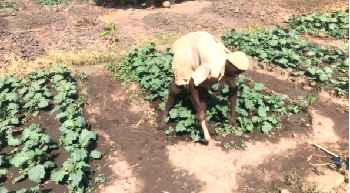For the past decades, Kanyizine Kansah, a 59-year-old visually impaired small-holder farmer at Karni in the Lambussie District in the Upper West Region, has been engaging in farming activities for survival.
In spite of his disability, he treks about 45 minutes each day to the farm to work.
Mr. Kansah cultivates cereal crops such as maize and millet as well as vegetables during the dry season.
He uses proceeds from the farm to feed his family and caters for the education of his three children.
He indicated that he decided to venture into farming because he did not want to be a burden on society or beg for survival.
However, Mr. Kansah has been recording poor yields for the past three years due to drought.
“I used to cultivate about four acres of maize and harvest about 20 bags, but for the past three years, I hardly get about four bags because of inadequate rainfall.
“In the dry season, I cultivate vegetables such as cabbage, onions and pepper but I have been recording poor yields because at the peak of the season, the stream I use to irrigate my crops often dries up due to the drought,” he narrated.
Due to the low yield, life has been tough for the visually impaired man and his family and it is a miracle that they have survived up to the next crop season, he said.
Just like Mr Kansah, Salifu Mariam, a physically challenged woman at Moaduri in the North East Region, is facing similar predicament.
Madam Mariam, who has been engaging in subsistence farming, had her entire two-acre farm swept away by floods last year.
Looking dejected and frustrated, she said, “life has not been easy after the flood destroyed all my food crops in the farm; now I am surviving on the benevolence of people.”
Climate crisis
Mr Kansah and Madam Mariam are part of a number of persons with disabilities (PWDs) in the country who are bearing the brunt of climate change.
An estimated one billion people worldwide live with a disability, eight in 10 of whom are in developing countries.
In Ghana, PWDs constitute about eight per cent of the total population, translating to about 2,098,138, according to the 2021 Population and Housing Census (PHC).
They contribute in diverse ways towards the development of the nation.
However, the majority of them live in abject poverty and often face discrimination as highlighted by the UN Convention on the Rights of Persons with Disabilities (CRPD).
As climate breakdown is accelerating rapidly, PWDs continue to experience the devastating effects through displacement, lost income and livelihood opportunities, hunger and health complications.
In rural communities in Ghana, particularly the north, perennial floods and drought are the glaring impacts of climate change which are worsening the plight of PWDs.
Impact
The Programmes Officer at the Ghana Federation of Disability (GFD) Organisations, Adam Abdul Wahab, in an interview, said PWDs were often among those most adversely affected in climate emergencies, encountering higher rates of morbidity and mortality.
For instance, he said they were more vulnerable to contracting infectious diseases because of underlying conditions.
“So, when we are talking about climate change and its impact, PWDs are the most vulnerable and worst affected.
“Persons with albinism suffer the most when it comes to climate change issues because the critical issue about them is skin cancer, which occurs when they are exposed to the scorching sun for a very long time,” he said.
Mr Abdul-Wahab added that PWDs are often left behind in the implementation of government policies and interventions, saying “as a country when we are planning policies and interventions, we don’t involve PWDs from the beginning, but after everything then we now realise that we should have involved them.”
He, therefore, called for the re-enactment of the Disability Act 715 in compliance with the UNCRPD, to help champion the cause of PWDs.
Source: graphic.com.gh


Comments are closed.